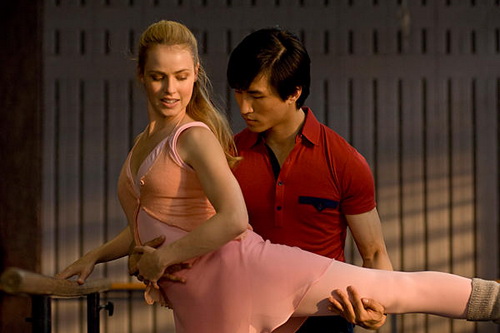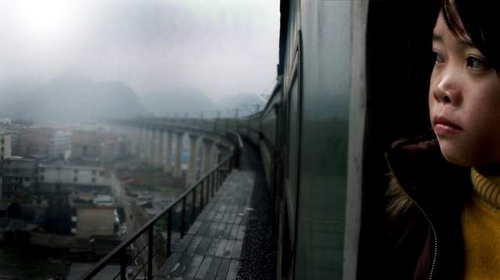Viewing China

Contemporary filmmakers are increasingly interested in modern China as a subject. I saw two popular films over the weekend that provided contrasting views worth considering:
Mao's Last Dancer is an Australian film based on the wildly popular memoirs of ballet dancer Li Cunxin. I have not read the book, but Li's life, even in laundry-list form, (an impoverished childhood, defection, exile and artistic acclaim) has the makings of dramatic gold. (watch the trailer here)
Dancer, both in script and artistic direction, is a throwback to the feel-good inspiration films of the eighties. The film weaves together segments from Li Cunxin's childhood, his stay in Beijing, and his first year in America. Li is chosen from an impoverished village in rural Shandong to study ballet in Beijing. Predictably, he makes up in "heart" and "passion" what he initially lacks in technique. When the director of the Houston Ballet arrives in Beijing for a visit, he spots Li's potential and invites him to America.
Li, wide-eyed and eager, is introduced to discotheques and shopping malls and quickly falls for a rosy-cheeked aspiring dancer named Liz.
After landing the role of Don Juan in a company production, Li wins the hearts of the Texas public. If this sounds dull, that's because it is. The actors playing Li and his first wife (Ci Cao and Amanda Schull) have little chemistry together, and limp through a number of awkward scenes propelled forward by a corny, lackluster script. An hour in, I was sorely regretting the 9 kuai I spent on the DVD.
Throughout the movie, Li is surrounded by a cast of irritating Americans, who either bully and manipulate him, or patronize him and treat him like an indulgent child.
What is interesting in this otherwise pointless movie is Beresford's failed case for the symbiotic relationship between capitalism and artistic freedom.
Near the beginning of the film, the young Li Cunxin is mesmerized while watching a banned tape of Baryshnikov. Inspired he sets out, as he put it, "to fly." But the film never lives up to this promise.
Once Li arrives in America, we mostly see him eating in restaurants and dancing in discos. The dance pieces in the film showcases the considerable skills of the performers, but they are more Broadway than ballet.
In Beijing, artistic freedom is non-existent as the dancers perform a ballet dramatizing the struggles of the liberation army for Madame Mao. But, for someone who knows very little about dance, it is hard to see how the Houston Ballet's overdramatized Don Juan is a superior piece. We never see Li developing as a dancer in America.
When Li finally defects, we suspect that it's the doe-eyed girl and the muffins and cocktails, not his art, that motivates his decision to sacrifice his family. All this is fine, but infinitely less heroic.
Overall, Beresford's biopic is so sincere in its endorsement of American consumerism that it often feels na?ve and woefully out of date.
More importantly, at a time when artistic expression is still stifled by government repression, a film about a dancer who valued artistic freedom above everything else should have more to say on its importance.
But of course, it doesn't.
The film may be a faithful rendition of Li's life, but it has also succeeded in making a true story feel manipulated and contrived.
The Last Train Home (归途列车), a documentary by Canadian director Fan Lixin traces a migrant couple's journey home for the Spring Festival over three consecutive years. It has been universally acclaimed, and I am not surprised.
The shots move easily from scenes inside the family home to panoramic shots of Guangzhou's natural beauty as well as crowded train stations and platforms, a seamless reminder of the film's global scope.
The plight of the Zhangs is echoed by millions of Chinese migrant workers, who leave their homes to manufacture goods for the insatiable world market.
It is hard not to feel sympathy for the harsh life of the workers, but the film is never a simple indictment of China's labor system.
Development, it is clear, has brought positive changes to China's population. Zhang Qin shops for clothes on her time off from the factory. A worker says in an interview that he is proud to be making tennis racquets to be shipped overseas. Migrants are offered a small (albeit inadequate) share in the benefits of the international capitalism.
The heart of the film, however, is what goes on outside the workspace.
The film is less about material conditions of China's factory workers than the impact of rapid modernization on Chinese families. The sacrifices that workers make for their families end up damaging, sometimes beyond repair, the relationships they value the most.
The film's main conflict is between the couple and their daughter, Zhang Qin. Having lived with her grandparents, Qin is understandably estranged from her parents. The Zhangs want their daughter to attend college, but Qin is not interested in studying. Persuaded by a friend, she leaves school to work in a denim factory.
After the New Year, Zhang Qin does not return to school but moves to Shenzhen. She finds work as a nightclub waitress and the film ends with her enjoying a night out with her coworkers, her future like that of millions just like her, uncertain.
Watching the two films back to back, I can't help but reflect upon China's changes in the past two decades.
America had been convinced political freedom would come naturally with economic prosperity and a rising middle class. Crudely put the thought is something like: if China embraces capitalism, then it will embrace democracy. But contemporary Chinese society challenges the very core of this assumption. In Beresford's film, freedom in America is uniformly conveyed through glittering malls, restaurants, and well-tailored suits. But Chinese cities are glittering with shopping centers, five star hotels and restaurants. Yet the range of acceptable political discourse remains woefully limited and government power remains largely unchecked.
There is also a palpable unease surrounding China's new-found wealth and the country's future.
Unprecedented growth and wealth are bought by stripping natural resources for raw materials and the exploitation of low-wage labor. The looming labor-shortage and rising gas prices are reminders that both will eventually run out. The time for quick turnarounds is over, and stable, long-term investments are not flooding in.
The country is further urging its population to embrace consumerism, but China's prosperity continues to depend on paying workers somewhat less than they deserve.
The smug triumph of the free-market capitalism presented in Dancer belongs to the past. Rising wages and greater economic freedom are important, but as Fan's documentary shows, they are nowhere near enough.
Links and Sources:
Christian Science Monitor: Mao's Last Dancer Image
mtime: Mao's Last Dancer Trailer
Eye Steel Film: Last Train Home
Youku: Last Train Home Trailer
The views posted here belong to the commentor, and are not representative of the Economic Observer |
Related Stories
Popular
Interactive
Multimedia

- EEO.COM.CN The Economic Observer Online
- Bldg 7A, Xinghua Dongli, Dongcheng District
- Beijing 100013
- Phone: +86 (10) 6420 9024
- Copyright The Economic Observer Online 2001-2011
















